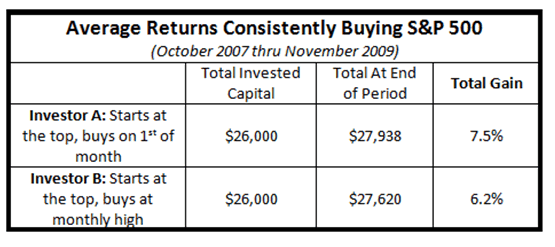The Stock Market is Going Lower, Buy Stocks…Now?
Stock-Markets / Investing 2009 Nov 12, 2009 - 09:38 AM GMTBy: Q1_Publishing
 It sounds crazy, I know.
It sounds crazy, I know.
All signs point to the market heading lower. The major indices are fundamentally overvalued, the real economy has barely improved, and expectations are approaching lofty highs.
It’s a recipe for a sharp and painful correction. And that’s why I’ve recently turned bearish on the markets in general.
Still though, the market rises. There are many factors for the rise, but the question is what to do now?
That’s where it may get a little confusing. I’m bearish, but I’m still recommending buying stocks.
On the surface, it doesn’t make any sense at all. But the facts reign over everything.
One Year Later…
It’s been more than two years since the Dow set an all-time record high in October 2007.
A lot has changed since then. Unemployment has surged, government has reached its tentacles further into the U.S. economy than ever before, and the markets have been going through their most extreme swings in decades.
The one thing that hasn’t changed is paying attention to the facts and how they should drive your investment decisions.
That’s why I was interested in learning how anyone who took our advice at the height of the market meltdown last November would be doing.
At the time, at the Prosperity Dispatch, we repeatedly proposed:
If you pick your buying spots, develop a plan, and don’t have overly optimistic expectations, you will be rewarded handsomely…
We were talking specifically about gold, silver, platinum, and other investment vehicles like convertible bonds, but I wanted to see how an investor would have done without the advantage of being in the best performing sectors over the past year. .
What I learned was a bit surprising.
Could Not Lose Money if You Tried
In one example, I looked at what would happen if an investor – let’s call him investor A -bought the S&P 500 SPDR ETF (NYSE:SPY) on the first of every month.
This investor, however, is the worst kind. He heard about the subprime crisis. He listened to the Fed when they said it was “contained.” And he waited to start investing when the “coast was clear” as the Dow was setting new all-time highs in October 2007.
This investor bought $1,000 worth of the S&P 500 on the first day of each month from October 2007 up until now. He ended up with a total return of 7.5%.
Remember, he started at the absolute worst possible time, consistently plowed money into the worst market in decades, and still made a total return of 7.5%.
But I realize most investors don’t buy stocks on arbitrary dates like the first trading day of the month. They try to time the market a bit and buy on dips. So I also wanted to see how a market timer would have fared. Not a good market timer though, but the absolute worst market timer.
So I looked at what would happen if an investor bought at the worst possible time each month. You know, the ultimate buy high, sell low kind of investor. Granted, it’s highly improbable someone would be able to time his buying at the exact top each month, but we’re looking to see how the worst did. And you cannot get worse than that.
Again, even the worst market timer fared well. An investor who bought $1000 worth of the S&P 500 at the worst possible time each month starting at the market highs last October would have come out a little under 1% ahead. Once dividends are added though, he would have made a total return of 6.2%.
The table below shows how well both of them did:

Not bad at all considering the S&P 500 is still off 25% from its 2007 highs – the same time these two investors started buying stocks.
A Steady Hand
As you can see, having a reasonable plan, investing consistently, and looking past the daily noise can pay off handsomely.
After all, these investors started at the worst possible time. They rode the ups and downs of the most volatile market in decades. And the market - as tracked by the S&P 500 - is still 25% below where they started buying at.
This is kind of an elementary example, but it does show how having a plan and sticking to it can make you a much better investor.
It also shows why, although I believe the markets headed lower, I’m still recommending buying stocks.
If the markets go down as we expect, we’ll be in position to buy more stocks at lower prices and be well positioned for the next rebound.
Or if the markets continue to rise, we’ll be in position to ride this market rally for all it’s worth.
Either way, they’re both great spots to be in and it’s not nearly as crazy once you take a step back and look at the facts.
Good investing,
Andrew Mickey
Chief Investment Strategist, Q1 Publishing
Disclosure: Author currently holds a long position in Silvercorp Metals (SVM), physical silver, and no position in any of the other companies mentioned.
Q1 Publishing is committed to providing investors with well-researched, level-headed, no-nonsense, analysis and investment advice that will allow you to secure enduring wealth and independence.
© 2009 Copyright Q1 Publishing - All Rights Reserved
Disclaimer: The above is a matter of opinion provided for general information purposes only and is not intended as investment advice. Information and analysis above are derived from sources and utilising methods believed to be reliable, but we cannot accept responsibility for any losses you may incur as a result of this analysis. Individuals should consult with their personal financial advisors.
Q1 Publishing Archive |
© 2005-2022 http://www.MarketOracle.co.uk - The Market Oracle is a FREE Daily Financial Markets Analysis & Forecasting online publication.



